Trees make the landscape. They provide a structural and visual anchor from which you can build the rest of the garden. However, not all of us have the space for a large tree.
Many people are growing beautiful gardens in small landscapes. They live in houses that are close together or have shallow front yards. Don’t let that stop you from planting a tree or two. Here are several spectacular specimens that top out at no taller than 25' when fully mature. They're perfect for providing a beautiful anchor and dynamic visual interest in even the most compact garden space.
In this blog, we'll explore 11 kinds of small trees perfect for front yards across Zones 7-11, ensuring you can find the ideal tree for your specific location and climate.
Find the perfect small trees for Zones 4-7 here.
Majestic Beauty® Fruitless Olive
(above) Upright beauty whose open branching habit and long, narrow gray-green leaves give it an airy appearance. Superior patio or garden tree that does not produce messy mature fruit. Thrives in hot, dry areas. Evergreen. Slow growing up to 25 ft. tall and wide. Zones 8–11
Beautifully Blooming Small Trees for Zones 7-11
Timeless Beauty® Desert Willow
Need a gorgeous tree for your drought-tolerant and/or firewise landscaping? You've found the perfect tree with Timeless Beauty. A long-blooming, seedless selection with fragrant, tubular, burgundy, and pale-lavender blooms that appear in clusters at branch ends. This is a gorgeous specimen for anchoring a border, or as a large patio container feature. Moderate growing; reaches up to 15 to 20 ft. tall and wide. Zones 7-9.
Natchez
Crape Myrtle
Panicles of pure white flowers bloom all summer with glossy dark green leaves that turn vibrant orange-red in fall. Makes an excellent specimen, accent, or group planting. Deciduous. Reaches up to 20' tall and wide. Zones 6–9.
Little Gem Dwarf
Southern Magnolia
Little Gem's narrow, compact form makes it perfect for narrow beds and corners. The large, glossy evergreen leaves have rusty-brown undersides. Large, white fragrant flowers bloom in late spring through summer. Evergreen. Moderate grower to 20-25' tall and 10-15' wide. Zones 7-9.
Royal Purple Smoke Tree
Dramatic, long-lasting, pinkish purple, smoke-like airy seed clusters backed by reddish purple foliage create a prized small tree or large accent shrub. Foliage holds its color all summer, then turns scarlet red in autumn. 15 ft tall, 12 ft wide. Zones 4-10
Small Trees with Unique Foliage for Zones 7-11
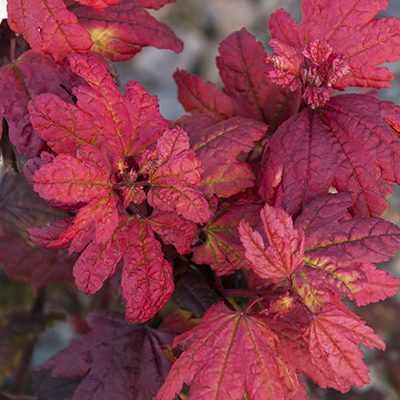
Plum Passion®
Vine Maple
Multiple stems sprawling beautifully through companions when planted in shade; in full sun, develops into a graceful small tree. Brilliant fall color. Deciduous. Moderate grower to 20 ft. tall and wide (smaller in full sun). Zones 6–9.
Summer Chocolate
Mimosa Tree
A unique mimosa that provides a wide, umbrella-shaped canopy with beautiful bronze-green, fern-like leaves. Foliage deepens to rich chocolate-burgundy color in summer. Delicate pink blooms appear in late summer. Fast grower reaches up to 20' tall, 15' wide. Zones 7-10.
Icee Blue®
Yellow-Wood
Our exclusive Icee Blue selection is the first podocarpus tree with distinctive blue foliage! New growth emerges lime-gray-blue and matures to a cool gray-blue-green, making for a dynamic visual appeal. Evergreen. Slow grower reaches 15-25' tall and wide. Zones 9-11.
Small Trees with Tasty Fruit for Zones 7-11
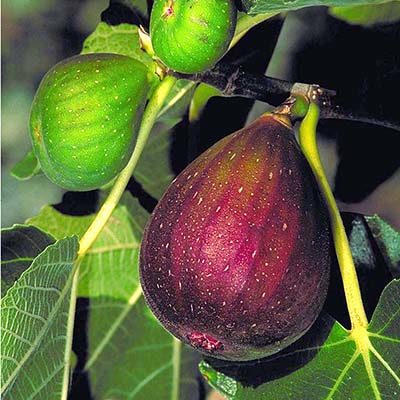
Brown
Turkey Fig
Especially tasty, brownish-purple fruit produced twice each year: late spring and late summer. Makes a beautiful specimen for garden or landscape with light annual pruning. Deciduous. Reaches up to 25' tall and wide. Zones 7-9.
Angel Red®
Pomegranate
Simply the best pomegranate on the market! Bright orange-red flowers are followed by large, vivid red fruit that ripens in early fall. Less pulp and higher juice content than others, with seeds soft enough to be eaten. Deciduous. Moderate grower to 10' tall and wide. Zones 7–11.
Pineapple
Guava
A versatile, easy-care shrub that can be pruned into a beautiful small tree or trained as an espalier or hedge. The upright branching form, edible flowers, and tasty tropical fruit make it a favorite for warm climate gardens. Perfect as a small specimen tree for landscapes and containers. Evergreen. Moderate grower to 10 to 15' tall and wide. Zones 8-10.
How To Select, Plant, and Care for Small Trees
Introducing small trees to your landscape can be incredibly rewarding, but it's natural to feel a bit overwhelmed at first. By following these guidelines and essential tips, you'll be well-equipped to create a thriving garden filled with healthy trees:
- Select the Right Tree: Choose a small tree that suits your landscape design, Zone, and soil conditions. Selecting a climate-appropriate plant will help ensure success. Consider some of the beautiful trees we explored above, such as the Timeless Beauty® Desert Willow for hot, dry climates, with its fragrant, tubular blooms, or the Little Gem Dwarf Southern Magnolia in more humid areas, perfect for narrow spaces with its compact form and large, fragrant flowers.
- Timing is Key: Planting your tree at the right time can make all the difference. Most trees do best when planted in early spring or fall when the weather is mild and the soil is workable. Avoid planting during extreme heat or cold.
- Pick the Perfect Spot: Consider your tree's sunlight needs when selecting a location. Ensure it receives the appropriate amount of sun or shade to thrive.
- Enrich the Soil: Before planting, give your small tree a strong start by enriching the soil with nutrient-rich compost. This will provide a solid foundation for your tree to establish its roots and flourish.
- Plant with Care: Dig a hole twice the width and just as deep as the root ball. Place the tree in the hole, and backfill it with nutrient-rich soil and water thoroughly to help the roots settle. Make sure not to plant the tree too deep; you should see the root flare above the soil line.
- Know Your Tree's Needs: Just like people, different tree species have unique light and water requirements. Some thrive in full sun, while others prefer partial shade. Familiarize yourself with your tree's specific needs to create the ideal growing environment.
- Prune with Purpose: Regular pruning keeps your small tree looking its best and promotes healthy growth. Remove any dead, damaged, or crossing branches to maintain a strong structure and improve air circulation.
- Stay Vigilant: Watch your small tree for signs of pests or diseases. Early detection and intervention can prevent minor issues from becoming major problems.
Remember, nurturing a small tree is a journey filled with learning and growth. Embrace the process, and don't be afraid to ask for guidance from experienced gardeners or local nurseries.
Why Choose Monrovia for Your Small Tree Needs?
At Monrovia, we understand that the perfect small tree can make all the difference in your landscape, and we're passionate about helping you find the ideal match for your garden. Our carefully curated selection of small trees is designed to cater to the diverse needs and preferences of gardeners and landscapers alike.
From stunning flowering varieties that add a burst of color to your yard, to unique foliage types that provide year-round interest, our small tree collection offers something for every garden. We take pride in growing our trees with expertise and care, ensuring you receive healthy plants that will thrive in your landscape for years. With Monrovia plants, you can confidently transform your outdoor space into the garden of your dreams.
Need more inspiration? You can subscribe to our monthly Grow Beautifully Newsletter to get inspiration, tips, design advice, and free digital guides delivered to your inbox twice a month.
FAQ's
How far from a house’s foundation should you plant a 25 ft. at maturity tree?
Here is a good rule of thumb when planting a tree away from the house. Use the distance equal to one-third to one-half the maximum tree height. Let us do the math here: no less than twelve feet from the house. Tree roots can grow beyond a tree's canopy, so some wiggle room is a very good idea.
Can small trees grow in pots?
Yes, small trees can thrive in pots, making them perfect for patios, balconies, and limited spaces. Choose dwarf or slow-growing varieties, use a pot with proper drainage, and ensure regular watering, fertilizing, and periodic repotting. With the right care, small trees can flourish in containers for many years.
What is the best tree for a small front yard?
To choose the best tree for a small front yard, consider ornamental varieties like Japanese Maple or Crabapple that offer manageable size, attractive foliage, and seasonal interest. Dwarf evergreen trees, such as Italian Cypress or Sky Pencil Japanese Holly, add vertical appeal without overwhelming the space. Select trees based on their mature size, growth rate, and maintenance needs to ensure a low-maintenance, visually appealing front yard. Whether you seek to create a tranquil backyard, enhance your curb appeal, or add a splash of color, Monrovia’s selection offers the perfect small tree for every aspiration.
What small trees offer rapid growth?
For those seeking to transform their landscape swiftly, a variety of small trees can provide a fast-growing solution. Crape Myrtles, Eastern Redbuds, and Flowering Dogwoods are among the quickest to establish, delivering both visual interest and a sense of maturity to your garden in a relatively short time.
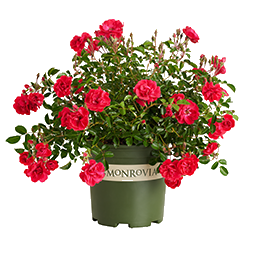
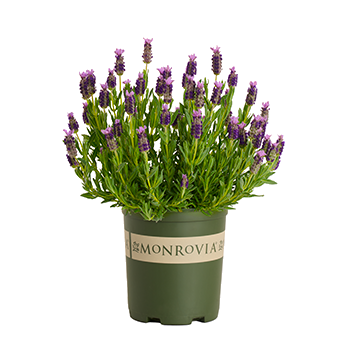
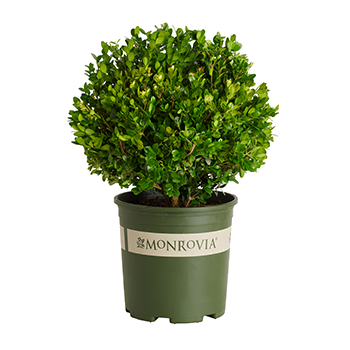










Please login to comment.
Don't have an account?
Sign Up for free